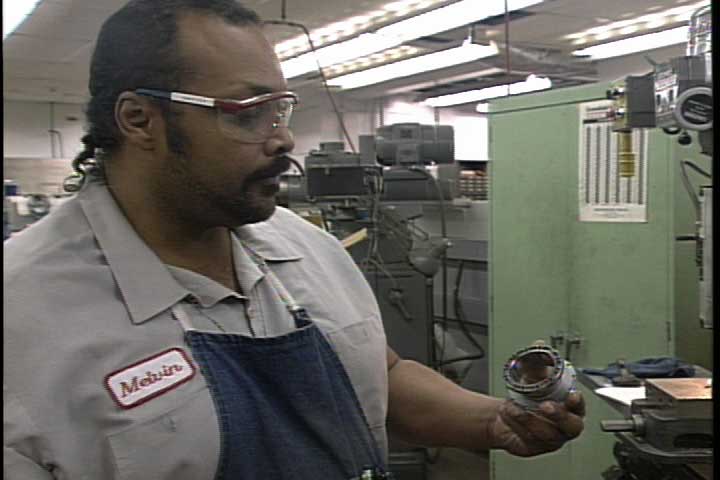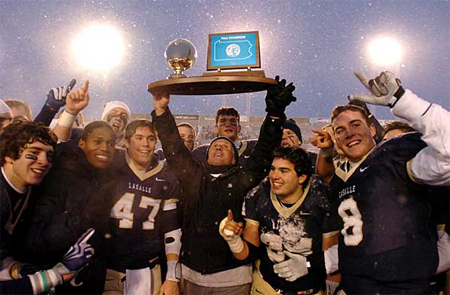
Melvin’s busy making spacecraft, but as soon as he’s on his break he’d love to hear your analysis of heteronormative role play in modern media.
Of course, it already is unnecessary, but try telling that to the liberal arts majors who seem to be providing most of the vocal power for the latest rallying cry/hashtag. No less formidable a force than the President of the United States has made “college affordability” his latest pet cause, arguing that the marketplace of education should be subject to something other than natural laws.
Things cost what they cost. Prices, with exceedingly rare exceptions, are inversely correlated to quantities bought. When the price of gas rises, it might not affect your own driving habits perceptibly, but one person in a hundred or a thousand is going to say, “Screw it, I’m taking the bus.” And if Chico’s decides to knock a few bucks off the price of its Magique pull-on ankle pants, they’ll sell more pairs to more fashionable if budget-conscious women. Raising prices means lower demand. Meanwhile sales (in the sense of “discounts”) increase sales (in the sense of “revenue”.) This is so obvious that pointing it out hardly counts as cogitation.
College was historically expensive, which is why a) for centuries, hardly anyone went and those who did were rich, and 2) in the last couple of generations, parents started creating college funds for their progeny. Save today, spend on Junior 18 years from now. It wasn’t easy, but supposedly nothing worthwhile is.
As a quantifier of how far we’ve advanced as a society, we’re reminded that university attendance is way up and that a larger ratio of our college-age colleagues are heading for tertiary education than ever before. This is supposed to be a pure representation of prosperity, akin to rising per capita income or declining infant mortality. In a future utopia, 100% of high school seniors will attend Harvard, Yale, or the safety school of their choice (probably Penn.)
What percentage of age-appropriate people should be attending college? Far less than do now. The evidence is overwhelming:
- The college graduate who works at a retail job, far from being a tragic anomaly, has gone beyond cliché and turned into a quotidian feature of life.
- Just about every personal finance blogger on the planet – i.e., people who think they have some sort of qualification for talking about money – carries tens of thousands of dollars in student loans and doesn’t even seem embarrassed by the situation.
- Tuition has outpaced inflation by about 150%. We’ll explain why this is in a minute.
- The most uncomfortable truth of all, for baccalaureate holders who want reality to be something other than what it’s currently constituted as: qualified blue-collar workers aren’t merely getting by, they’re prospering. Nor are they going into debt to do it.
Regarding the 3rd point above: when the federal government began the nationalization of education financing, that put downward (political) pressure on interest rates. After all, what’s the point of bureaucrats getting involved at the behest of our elected representatives if they can’t lower rates for the benefit of the voting public? Interest rates went from what the market would bear – i.e., where the lowest rate lenders were willing to offer matched the highest rate students and their parents were willing to pay – to something lower than that. Sallie Mae has no incentive to turn a profit in the same manner that independent lenders would, knowing that taxpayers can and will make up the difference.
The schools still operate with respect to the balance sheet, however. The University of Michigan might not be a for-profit venture in the same sense that DeVry or the University of Phoenix is, but the former still has an endowment to maintain and expenses to pay. Out of tuition and gifts mostly, and tuition monies are less subject to whim and variance than donations are. So…
If you’re a university, why not increase tuition far beyond its historic norms? You have tens of thousands of potential incoming students, all of whom have been convinced (or convinced themselves) that what you’re selling is indispensable. Throw a dead cat (its body donated by the biology department, where smart kids are learning marketable skills) and you’ll hit a professor (its body taking up space in the humanities department) who will argue that college education is a public utility of comparable import to electricity and water. The only difference is that the local power company is probably a mandated monopoly that’s forced by law to charge below-market rates that cover expenses and allow for a modest profit. Meanwhile, universities don’t operate under such constraints. If every university in the United States decided tomorrow to double its tuition, students would grumble, lead protests, wear Che Guevara shirts, listen to Rage Against The Machine, maybe even burn effigies of Richard Nixon, but they’d still get their parents to pay. Largely because they can’t see nor comprehend the price tags. I still have enough to pay for this week’s pot and hummus wraps, right? That’s all that matters. Besides, I don’t have to start paying back until I graduate.
Perverse incentives, again. Now you’ve just given Johnny Undergrad motivation for spending money and time on a master’s degree and deferring life even longer.
Debt will kill you, often creating a hole in 4 years that you can spend 8 times as long digging out of. It doesn’t matter: education remains a drug more desirable than the purest batch of crack. Maybe that’s the problem, a semantic one. “Education” implies a universal good, like “health” or “prosperity”. But education is what you get when you absorb and retain practical knowledge. Which indicates true education – knowing that Shakespeare intended Prospero to be an autobiographical character in The Tempest, or knowing that the duration of a vehicle’s spark line is based on total primary circuit resistance and coil voltage available?
Now, knowing which of those will remedy a weak fuel/air mixture and get someone’s car running smoothly? Okay, which of those can you learn only in an inexpensive community college or trade school? Finally, which will impress an employer (excluding deans of college English departments), and make a tangible difference in the world?
Stop complaining, and stop moving in a direction other than forward. When a significant portion of college students realize they’ll be better off elsewhere, those colleges will notice. When parents begin to acknowledge that the math will never pencil out on their daughter’s performing arts degree, purveyors of higher education will have no choice but to communicate more effectively to their clientele exactly what they’re getting for the money. And hopefully, our demagogues in charge will realize that the stated goal of higher enrolment shouldn’t be an end unto itself.




